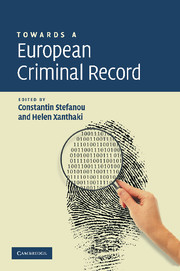Book contents
- Frontmatter
- Contents
- List of contributors
- Preface and acknowledgements
- 1 Introduction: How did the idea of a European Criminal Record come about?
- PART I
- PART II
- 5 The European Criminal Record in Austria
- 6 The European Criminal Record in the Czech Republic
- 7 The European Criminal Record in Germany
- 8 The European Criminal Record in Greece
- 9 The European Criminal Record in Hungary
- 10 The European Criminal Record in Ireland
- 11 The European Criminal Record in the Netherlands
- 12 The European Criminal Record in Slovenia
- 13 The European Criminal Record in Slovakia
- 14 The European Criminal Record in Spain
- 15 The European Criminal Record in England and Wales
- PART III
- 19 Conclusions
- Index
5 - The European Criminal Record in Austria
Published online by Cambridge University Press: 13 July 2009
- Frontmatter
- Contents
- List of contributors
- Preface and acknowledgements
- 1 Introduction: How did the idea of a European Criminal Record come about?
- PART I
- PART II
- 5 The European Criminal Record in Austria
- 6 The European Criminal Record in the Czech Republic
- 7 The European Criminal Record in Germany
- 8 The European Criminal Record in Greece
- 9 The European Criminal Record in Hungary
- 10 The European Criminal Record in Ireland
- 11 The European Criminal Record in the Netherlands
- 12 The European Criminal Record in Slovenia
- 13 The European Criminal Record in Slovakia
- 14 The European Criminal Record in Spain
- 15 The European Criminal Record in England and Wales
- PART III
- 19 Conclusions
- Index
Summary
Introduction
The establishment of a European Criminal Record (ECR) seems to be a logical consequence of a unified Europe, especially with regard to transborder and international crime. Criminals can exploit the opportunities of a free market without borders, now open to them as to any EU citizen. Besides its positive aspects, it also opens more possibilities for criminal organisations and organised crime to act in many countries or enables offenders to leave one Member State after a conviction and to start working in another one. In this unified Europe an ECR could offer the possibility to find out whether a person has already been convicted in another Member State.
As usual, enhanced tools for fighting crime, such as the ECR, also bear a risk of abuse and raise questions about adequate human rights protection. Moreover, it is important to ask if the creation of an ECR is possible without harmonisation of criminal law systems. Since the EC does not have a competence to create criminal law, according to the prevailing opinion, twenty-seven different criminal law systems exist with different offences, different penalty systems, different systems of criminal records and different periods of erasure. How can one criminal record be created for the whole of the EU, if such fundamental elements for a criminal record are not harmonised? This chapter will analyse these questions and identify possible inputs on the Austrian legislation.
Before discussing the ECR, it is necessary to look at the Austrian legislation on criminal records.
- Type
- Chapter
- Information
- Towards a European Criminal Record , pp. 107 - 137Publisher: Cambridge University PressPrint publication year: 2008



